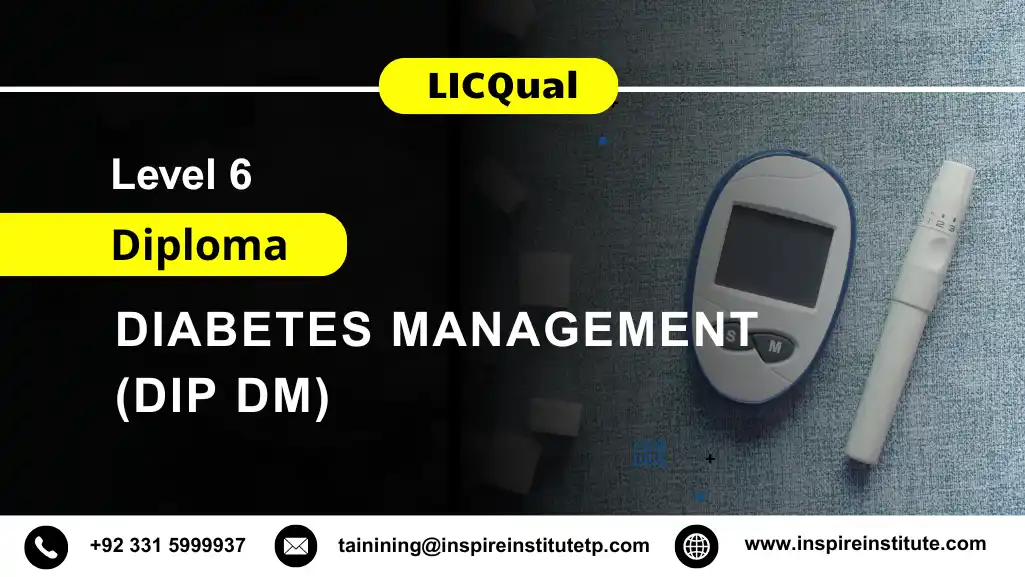LICQual Level 6 Diploma in Diabetes Management (Dip DM)
The LICQual Level 6 Diploma in Diabetes Management (Dip DM) is a specialized qualification designed for healthcare professionals seeking to advance their knowledge and expertise in diabetes care. As diabetes continues to be one of the most prevalent global health challenges, this Diabetes Management Diploma provides in-depth understanding and practical competencies essential for effective patient management and long-term care strategies.
This advanced diabetes care course focuses on equipping learners with comprehensive theoretical knowledge of diabetes pathophysiology, types, complications, and treatment modalities. Participants will explore evidence-based approaches to diabetes prevention, diagnosis, and management, gaining the ability to deliver high-quality, patient-centered care across diverse healthcare settings. The course emphasizes an integrated approach that combines medical science with lifestyle interventions and behavioral management techniques.
Through this clinical diabetes training, learners will develop essential practical skills for assessing, monitoring, and supporting individuals with diabetes. The program provides detailed instruction on insulin therapy, nutrition management, blood glucose monitoring, and chronic complication prevention. By mastering these competencies, graduates will be able to implement effective diabetes control programs and improve patient outcomes in both clinical and community environments.
Why Choose this Qualification
The LICQual Level 6 Diploma in Diabetes Management (Dip DM) is a prestigious qualification tailored for healthcare professionals aiming to specialize in the field of diabetes care and management. This advanced course provides the scientific foundation, clinical understanding, and practical expertise required to effectively manage one of the most significant global health challenges. By completing this program, learners gain measurable skills, evidence-based knowledge, and professional recognition essential for delivering high-quality diabetes care in hospitals, clinics, and community settings.
Key Reasons to Choose this Qualification
Comprehensive Knowledge of Diabetes Care
- Gain an in-depth understanding of the pathophysiology, classification, and epidemiology of diabetes.
- Learn evidence-based approaches to diagnosing and managing Type 1, Type 2, and gestational diabetes.
- Understand the physiological mechanisms behind insulin resistance and glucose metabolism.
- Study the complications of diabetes, including neuropathy, nephropathy, and retinopathy.
- Integrate scientific knowledge into practical, patient-centered diabetes management.
Advanced Clinical and Practical Skills
- Master techniques for blood glucose monitoring and insulin administration.
- Learn to develop and implement individualized diabetes care plans.
- Acquire skills for patient consultation, dietary counseling, and medication management.
- Enhance your ability to identify and manage acute and chronic diabetic complications.
- Build confidence in applying evidence-based protocols within clinical settings.
Evidence-Based Practice
- Apply current clinical research and best practice guidelines to diabetes management.
- Learn to evaluate and interpret diabetes-related studies and outcomes.
- Develop skills in data-driven decision-making and clinical reasoning.
- Implement evidence-based strategies to improve patient care and disease control.
- Contribute to advancing healthcare practices through critical evaluation and research application.
Career Advancement and Professional Recognition
- Earn a UK-accredited diabetes management certification valued worldwide.
- Enhance employability and qualification for senior or specialist diabetes care roles.
- Demonstrate advanced competence to employers, peers, and regulatory bodies.
- Gain recognition as a skilled professional committed to excellence in diabetes care.
- Strengthen your credentials for postgraduate education or research opportunities.
Patient-Centered Care and Communication
- Learn effective communication and counseling techniques for diabetes patients.
- Develop empathy, cultural sensitivity, and motivational interviewing skills.
- Gain the ability to educate patients on self-management, lifestyle modification, and prevention.
- Enhance collaborative care with multidisciplinary healthcare teams.
- Improve patient adherence and long-term health outcomes through personalized care.
Flexible and Accessible Learning Pathway
- Study through a structured, assignment-based format ideal for working professionals.
- Access high-quality materials and academic support through flexible online learning.
- Balance study and professional responsibilities with a self-paced approach.
- Engage in interactive case studies and applied clinical assessments.
- Achieve measurable academic growth while maintaining your current healthcare role.
Ethical and Professional Competence
- Understand the ethical, legal, and professional frameworks of diabetes care.
- Apply safe, responsible, and patient-focused clinical practices.
- Develop decision-making skills aligned with healthcare policies and clinical standards.
- Learn to uphold confidentiality, integrity, and professionalism in diabetes management.
- Promote ethical leadership and accountability within healthcare environments.
Continuous Professional Development
- Engage in reflective practice to improve clinical performance and patient care.
- Develop lifelong learning habits that support ongoing professional growth.
- Stay updated with evolving trends and innovations in diabetes management.
- Build a network of professionals dedicated to advancing diabetes education and care.
- Position yourself as a leader in clinical diabetes practice and community health initiatives.
Choosing the LICQual Level 6 Diploma in Diabetes Management (Dip DM) ensures that learners acquire not only academic excellence but also practical competence and ethical awareness in diabetes care. This qualification empowers professionals to make meaningful contributions to healthcare, improve patient outcomes, and advance their careers in the ever-evolving field of diabetes management.y and deliver high-quality, professional services.
Course Overview
LICQual UK Awarding Body
Average Completion Time:
6- 24 Months
Study Units: 6 Units
Evidence & Assignment Based
Mandatory Units
Who Should Take This Course
The LICQual Level 6 Diploma in Diabetes Management (Dip DM) is a specialized qualification designed for healthcare professionals and aspiring clinicians who aim to expand their expertise in diabetes prevention, diagnosis, and treatment. As diabetes continues to rise globally, this course provides the essential medical understanding and clinical proficiency needed to deliver evidence-based care and improve patient outcomes. Learners will gain advanced knowledge, analytical skills, and hands-on strategies that prepare them to take on greater responsibilities in both clinical and community health settings.
This Course is Suitable For
Medical Practitioners and Physicians
- Enhance your understanding of the pathophysiology and management of Type 1 and Type 2 diabetes.
- Gain the ability to apply evidence-based treatment approaches in clinical settings.
- Learn to identify, monitor, and manage diabetic complications using global care standards.
- Strengthen your decision-making skills for individualized diabetes care planning.
- Build professional recognition through a UK-accredited diabetes management diploma.
Nurses and Diabetes Educators
- Acquire practical knowledge for blood glucose monitoring, insulin administration, and dietary counseling.
- Learn to design patient-centered diabetes education and lifestyle management programs.
- Develop the communication skills necessary for motivating and supporting patients.
- Gain tools to assess and track patient progress using clinical data and patient feedback.
- Advance your career as a certified diabetes educator or specialist nurse.
Pharmacists and Clinical Nutritionists
- Understand pharmacological interventions for glycemic control and insulin therapy.
- Learn the impact of nutrition and medication interactions in diabetes management.
- Gain the ability to provide patient counseling on medication adherence and lifestyle modification.
- Explore the role of nutritional therapy and diet planning in diabetes prevention.
- Strengthen collaboration with multidisciplinary healthcare teams for integrated care delivery.
Allied Health Professionals
- Expand your understanding of diabetes-related complications and their management.
- Learn to identify risk factors and support early detection in community and clinical contexts.
- Develop competency in preventive health education and patient support programs.
- Gain practical insight into long-term management strategies for diabetic patients.
- Contribute to interprofessional healthcare initiatives aimed at improving diabetic care outcomes.
Public Health Specialists and Policy Makers
- Acquire knowledge of global diabetes trends, prevention strategies, and management frameworks.
- Learn to design public health programs that promote early detection and awareness.
- Understand the socio-economic impact of diabetes and strategies for cost-effective management.
- Develop policies that support diabetes prevention and healthcare equity.
- Enhance your leadership capacity in national and international health organizations.
Healthcare Administrators and Managers
- Learn to manage diabetes care programs within hospitals and primary healthcare systems.
- Develop skills in healthcare quality assurance, monitoring, and evaluation.
- Understand clinical governance, ethical considerations, and health policy in diabetes management.
- Gain strategic insights into resource allocation and service improvement.
- Strengthen your managerial competence for leading diabetes-focused healthcare teams.
Biomedical and Health Science Graduates
- Build a strong foundation in diabetes research, diagnostics, and management protocols.
- Gain exposure to clinical applications of biomedical science in diabetes care.
- Learn data interpretation and analysis relevant to diabetes research studies.
- Develop academic and practical readiness for advanced medical or healthcare qualifications.
- Position yourself for a successful career in healthcare research or clinical science.
Professionals Seeking Career Advancement in Healthcare
- Obtain a globally recognized diabetes management certification to enhance your career profile.
- Transition into specialized roles within clinical, educational, or community health sectors.
- Broaden your healthcare expertise and strengthen multidisciplinary collaboration skills.
- Develop leadership capabilities for managing diabetes care initiatives.
- Stay updated with modern diabetes technologies, management trends, and clinical innovations.
The LICQual Level 6 Diploma in Diabetes Management (Dip DM) is ideal for individuals committed to improving the lives of patients living with diabetes. Whether you are a clinician, educator, researcher, or health policy specialist, this qualification empowers you with the competence, confidence, and credibility needed to make a measurable impact in modern healthcare. It bridges theoretical understanding with clinical excellence, ensuring that every graduate contributes effectively to the fight against diabetes worldwide.ir career progression and clinical competence.fully equipped to deliver safe, professional, and high-quality aesthetic services while advancing their careers.
Course Benefits
The LICQual Level 6 Diploma in Diabetes Management (Dip DM) provides an advanced and structured learning experience for healthcare professionals, nurses, and medical practitioners seeking to specialize in diabetes care. This UK-accredited Diabetes Management Diploma integrates theoretical understanding with practical clinical application, empowering learners to prevent, diagnose, and manage diabetes and its complications effectively. As an assignment-based programme, it combines flexibility with academic excellence—ideal for medical professionals aiming to enhance their expertise, confidence, and career progression in the field of diabetes management and chronic disease care.
Key Benefits of the Course
Specialist Knowledge
- Gain a comprehensive understanding of diabetes pathophysiology, classification, and diagnostic criteria.
- Learn about the mechanisms, causes, and risk factors associated with Type 1, Type 2, and gestational diabetes.
- Study the pharmacological management of diabetes, including insulin therapy and oral hypoglycemics.
- Understand the principles of nutrition, exercise, and lifestyle modification in diabetes prevention and control.
- Acquire knowledge of international guidelines, ethical practices, and patient-centered diabetes management strategies.
Practical Application
- Develop clinical skills in diabetes screening, diagnosis, and glycemic monitoring.
- Learn to design individualized care plans integrating pharmacological and lifestyle interventions.
- Gain experience in conducting patient consultations, education sessions, and follow-up assessments.
- Apply theoretical knowledge to real-life case studies and clinical scenarios through assignments.
- Build confidence to provide safe, evidence-based care for patients with complex diabetic conditions.
Recognised Qualification
- Earn a UK-recognised Diabetes Management Qualification that demonstrates professional expertise.
- Enhance your career profile in hospitals, clinics, community health centers, and medical research institutions.
- Gain recognition for meeting measurable competencies aligned with global diabetes care standards.
- Strengthen your credentials for progression into advanced clinical, academic, or research roles.
- Achieve a reputable qualification that reflects a high standard of clinical excellence and commitment to patient care.
Flexible Learning Pathway
- Study through a structured, assignment-based format that accommodates professional commitments.
- Learn at your own pace without compromising your current healthcare or clinical responsibilities.
- Access comprehensive study resources and continuous academic support from diabetes specialists.
- Combine theoretical modules with practical case-based learning for a well-rounded experience.
- Benefit from a flexible structure that promotes professional growth and lifelong learning.
Evidence-Based Training
- Learn the latest evidence-based approaches to diabetes prevention, diagnosis, and treatment.
- Understand clinical research findings that shape modern diabetes management protocols.
- Gain practical knowledge of diagnostic tools such as HbA1c testing, glucose monitoring, and insulin titration.
- Develop the ability to evaluate treatment outcomes and adjust care plans accordingly.
- Stay updated with emerging trends in diabetes technology, telemedicine, and digital health interventions.
Career Development
- Qualify for advanced or specialized roles in diabetes clinics, hospitals, or public health sectors.
- Increase employability and earning potential through a globally recognized Diabetes Management Diploma.
- Gain a competitive advantage in both local and international healthcare markets.
- Build a professional portfolio demonstrating expertise in diabetes prevention, education, and treatment.
- Position yourself for leadership roles in chronic disease management and healthcare delivery.
Enhanced Patient Care and Clinical Outcomes
- Improve diagnostic accuracy and treatment planning for patients with various diabetes types.
- Learn effective patient education, counseling, and self-management support techniques.
- Apply practical skills to deliver safe, ethical, and personalized diabetes care.
- Understand contraindications, risk management, and the importance of follow-up monitoring.
- Contribute to improved long-term patient outcomes through compassionate, evidence-based care.
Professional Growth
- Prepare for higher-level responsibilities in clinical, educational, or research environments.
- Develop advanced analytical, critical thinking, and problem-solving abilities.
- Strengthen professionalism, ethical awareness, and clinical leadership in diabetes management.
- Gain the confidence to work independently or collaboratively within multidisciplinary healthcare teams.
- Enhance documentation, patient assessment, and outcome evaluation skills essential for modern clinical practice.
The LICQual Level 6 Diploma in Diabetes Management (Dip DM) empowers learners with advanced medical knowledge, clinical skills, and professional competencies to excel in diabetes care and management. Combining academic rigor with practical application, this UK-accredited diabetes qualification prepares healthcare professionals to provide high-quality, patient-centered, and evidence-based diabetes services. Graduates of this programme emerge as skilled practitioners ready to make a meaningful impact on public health, chronic disease management, and clinical excellence across healthcare settings worldwide.
Eligibility Criteria
The LICQual Level 6 Diploma in Diabetes Management (Dip DM) is designed for healthcare professionals, medical practitioners, and individuals aiming to specialize in the prevention, diagnosis, and management of diabetes and related metabolic disorders.
Age Requirements:
Learners must be at least 18 years of age at the time of enrollment.
Mature learners with relevant healthcare experience and professional backgrounds are strongly encouraged to apply.
There is no upper age limit, provided the applicant meets the required academic and professional criteria.
Educational Requirements:
A Level 5 qualification or equivalent in a related field such as medicine, nursing, pharmacology, or healthcare sciences.
Alternatively, applicants with significant professional experience in diabetes care, endocrinology, or general healthcare may be accepted through Recognition of Prior Learning (RPL).
Candidates must demonstrate academic competence and the ability to complete written assignments and clinical analyses at a higher education level.
Professional Experience:
Applicants should ideally possess practical experience in healthcare, nursing, or clinical practice, particularly within diabetes or chronic disease management.
Experience in general medicine, endocrinology, or community healthcare will be considered a strong advantage.
Professionals currently employed in hospitals, clinics, or public health organizations are highly encouraged to enroll.
Candidates with limited hands-on experience but strong theoretical knowledge or an academic background in healthcare may be considered on a case-by-case basis.
English language proficiency.
Non-native English speakers are required to have a minimum IELTS score of 5.5 or an equivalent qualification.
Applicants without formal test results may demonstrate English proficiency through previous academic study, professional communication, or an internal assessment conducted by the learning provider.
The Qualification Process
LICQual Level 6 Diploma in Diabetes Management (Dip DM) follows a structured pathway to ensure learners gain comprehensive knowledge, practical skills, and professional competence in community oral healthcare.
Step 1: Self-Assessment
Learners review the entry requirements to confirm eligibility. Candidates with a background in dentistry, oral health, or public health are encouraged to apply.
Step 2: Registration
Complete the registration process by submitting required documents such as proof of qualifications, a valid ID, and payment of enrollment fees.
Step 3: Induction
An induction session is conducted to:
- Verify learner eligibility and documentation.
- Introduce study materials, learning outcomes, and assessment procedures.
Step 4: Learning and Evidence Submission
Learners complete assignments, case studies, and practical exercises demonstrating competence in public health dentistry, community oral health assessment, preventive strategies, and program planning.
Step 5: Feedback and Revision
Assessors review submitted evidence and provide constructive feedback. Learners can revise and resubmit work to meet all required standards.
Step 6: Competence Validation
Final submissions are evaluated to confirm that learners have met all theoretical and practical learning outcomes.
Step 7: Internal Quality Assurance (IQA)
The IQA team reviews the assessment process to ensure accuracy, fairness, and compliance with international standards.
Step 8: External Verification (EQA)
External verifiers validate the authenticity and quality of learner achievements.
Step 9: Certification
Upon successful verification, learners are awarded LICQual Level 6 Diploma in Diabetes Management (Dip DM), demonstrating advanced proficiency in community oral healthcare and preparing them for professional growth in dental public health, preventive dentistry, and healthcare policy.







